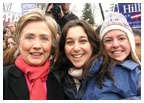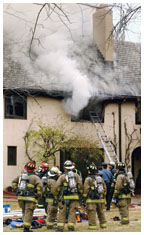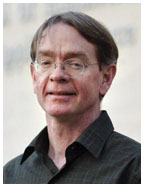
|
February 13, 2008: Notebook
At the center of the action as the campaign unfolds
Semester in Kenya canceled because of post-election violence
Faculty apartment ruined in blaze
From oil politics to neuroethics, a sampler of new spring courses
BREAKING GROUND-Environmental Engineering
Seniors Peri Rosenstein, center, and Regina Lee with Sen. Hillary Clinton in Manchester, N.H. The two were among 19 Princeton students who spent a week in New Hampshire working for candidates. (courtesy Peri Rosenstein ’08) |
At the center of the action as the campaign unfolds
As the presidential primary season moved into high gear last month, Princeton students got a firsthand look at the Iowa caucuses and the New Hampshire primaries.
From attending Sen. Barack Obama’s victory speech in Iowa to canvassing voters on behalf of five different candidates in New Hampshire, undergraduates and graduate students witnessed the political process at work.
Two dozen public-policy graduate students from the Woodrow Wilson School spent two days before the Jan. 3 caucuses in Nevada, Iowa, a sleepy town of 7,000 residents where professors from nearby Iowa State and farmers mingle at local barbecue joints. For a few weeks every four years, however, the national media flock there to cover the Iowa caucuses.
“I went to get a close-up look at the primaries that I have followed from afar for many years,” said Anthony Segal, a first-year master’s student from the United Kingdom who went on the trip. “I got a sense of just how much pride the people [in Iowa] take in being the focus of national attention.”
Tom Niblock, a first-year master’s student at the Wilson School, said that he was already planning on traveling to Nevada — his hometown — for the caucuses when some classmates expressed interest in accompanying him. Niblock is co-chairman of the Woodrow Wilson Political Network, a nonpartisan student organization dedicated to getting students and alumni involved in politics, and he turned the trip into a group opportunity to observe the political process.
The day before the caucuses, the students attended a dinner discussion with Iowa caucus veterans, including congressmen and party volunteers. Students also attended campaign rallies of prominent candidates, and several witnessed Obama’s victory speech in Des Moines. “I’ve never seen a political rally that excited before,” Niblock said.
Meanwhile, other Princeton students in Manchester, N.H., were gearing up to campaign for the Jan. 8 state primaries.
These students were among 19 undergraduates and grad students sponsored by the Pace Center as part of its civic-engagement initiative. The group spent the week before the primaries working for the campaign of each student’s choice, canvassing votes and working on phone banks while staying in the homes of party volunteers. The students also attended panel lectures on the political process at Saint Anselm College in Manchester. Melissa Harris-Lacewell, associate professor of politics and African-American studies at Princeton, accompanied the students.
“We wanted students to develop a deeper and richer understanding of the specific role of the New Hampshire primary in [political] processes,” said Andrew Seligsohn, the Pace Center’s coordinator for civic-engagement learning and the organizer of the trip.
“I wanted to have some sort of civic engagement in my life, and this was a great opportunity,” said Sunny Khemlani, a psychology Ph.D. student who volunteered for Obama on the trip. “I could engage with fellow students from Princeton and see tons of candidates and rallies in a very short time.”
Khemlani was one of 10 students working on the Obama campaign. Pace volunteers also worked for Sen. Hillary Clinton, Sen. John McCain, Gov. Bill Richardson, and Rep. Dennis Kucinich.
At a post-trip discussion dinner, students compared notes from their respective campaigns: Chris Nenno ’08, who worked for McCain, noted that many people he called asked about immigration; Jacob Aronson ’11 from the Richardson campaign said he spoke with voters about everything from the war in Iraq to mental health; Clinton volunteer Regina Lee ’08 commented on the cynical language with which some voters talked about Clinton.
On the day of the primaries, students from all of the campaigns worked the polls and drove elderly and disabled people to their voting locations.
“The most memorable moment for me was getting a call from our
supervisor telling us that Hillary had won the town where we were working
by a much larger amount than staffers had predicted,” said Jack
Ackerman ’11, a volunteer for the Clinton camp. “The campaign
[gave] us personal ownership over our small part of the state, and when
the results for our town came out we knew that our hard work had paid
off.” ![]()
By Isia Jasiewicz ’10

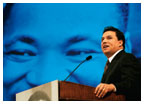 |
José Huizar *94, the first Latino immigrant elected to the Los
Angeles City Council and Princeton’s first Latino trustee, delivered
the keynote address at Princeton’s Martin Luther King Jr. Day Celebration
Jan. 21. Immigration was the theme of this year’s event, and Huizar
said that today’s immigrant-rights marches draw inspiration from
King’s work for civil rights. “If you look where each struggle
has been or each struggle is going, it is clear that both travel on the
same road,” he said. “They seek to expand the dignity of human
rights. They are motivated by the desire for equal opportunity. They embrace
justice. But most importantly, they fulfill the need to make a better
life.” During the event at Richardson Auditorium, the University
honored area schoolchildren who contributed posters, essays, or videos
to the annual King Day contests. Journey Awards for achievement and service
were presented to Anna Almore ’08, a leader in the Black Student
Union’s mentoring program, and John Templeton, assistant dean for
graduate admissions in the Woodrow Wilson School. ![]()

Semester in Kenya canceled because of post-election violence
Citing safety concerns in the wake of a violently disputed presidential election, the University cancelled its spring field semester in Kenya in early January, according to Professor Dan Rubenstein, chairman of the ecology and evolutionary biology department.
Five undergraduates were scheduled to make the trip to Kenya with Ruben-stein, who also directs Princeton’s Program in African Studies. But when President Mwai Kibaki was re-elected in late December, opponents protested, alleging fraud, and a series of deadly clashes followed.
Rubenstein called off the trip Jan. 8, after communicating with friends in Kenya and monitoring news reports for more than a week. He told President Tilghman and other Princeton officials that parts of the 12-week itinerary could pose a risk for students and professors. “The key is that I would never put students in a situation where violence is common and occurs at unpredictable times and places,” Rubenstein said in an e-mail to PAW.
Four of the affected students will join Princeton’s tropical biology semester in Panama, while the fifth, who studied in Panama last year, will remain on campus.
The Kenya semester, which began in 2006, featured hands-on courses in conservation, the natural history of mammals, and restoration ecology, taught at several sites, including the Princeton-affiliated Mpala Conservancy, a 48,000-acre ranch and research area established by George Small ’43.
Several Princeton faculty and students have conducted research in Kenya.
Professor Jeanne Altmann was working in Amboseli, near the Tanzanian border,
at the time of the recent election and returned to Princeton two weeks
after the violence began. Rubenstein said he plans to continue his research
at Mpala this summer, as long as “calm and normalcy return.”
![]()
By B.T.

(Frank Wojciechowski) |
Faculty apartment ruined in blaze
A smoky fire gutted one unit and damaged others Jan. 10 in the University-owned College Road Apartments across from McCarter Theatre Center. No one was injured in the fire, which took a dozen fire departments from area towns more than two hours to extinguish. Faculty and staff live in the
13-unit building, which was constructed in 1922. Borough fire officials
said the cause was accidental. Though residents moved back into eight
of the apartments, five will remain vacant indefinitely.
![]()

From oil politics to neuroethics, a sampler of new spring courses
(Illustrations by Steven Veach)
With the start of the spring term comes PAW’s annual sampling of courses offered at Princeton for the first time. With more than 1,100 courses to choose from — about 110 of them new — the selection process for students can be daunting. Here are six new courses, from a range of disciplines:
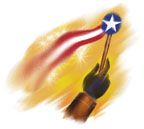 ANT
361: Magic and “Magic(al) Realism” in American Social and
Economic Life
ANT
361: Magic and “Magic(al) Realism” in American Social and
Economic Life
Professor: Lawrence Rosen
For anthropologists, magic is a natural subject, Rosen says, because in any culture, people are rational about some things and not about others. This view of magic is not about tricks, he says, but how a culture deals with uncertainty “by conducing the world to fit our expectations.” Who hasn’t thrown a bowling ball without at some point applying some “body English” to try to influence its path, Rosen asks. Cultures have characteristic ways in which they do the same things, he says, and the course will examine how American culture relates the magical to the economic, social, and political arenas. One example is the American predilection for quantifying information as a test of credibility. “We feel a lot better if we can put a number on it; if we don’t have the number, then we’re not quite in control,” he says. The course is one of several at the University developed with the support of the David A. Gardner ’69 Magic Project.
Sample reading list: Robert Schiller, Irrational Exuberance; Jennifer Hecht, Doubt: A History; H.G. Bissinger, Friday Night Lights: A Town, A Team, A Dream; Dennis Covington, Salvation on Sand Mountain; Bryan Wilson, Magic and the Millennium
 FRS
176: Authentic Arab Voice
FRS
176: Authentic Arab Voice
Professor: Daoud G. Kuttab
When Kuttab, a Palestinian journalist and commentator, first proposed his spring seminar, he jokingly called it “everything you always wanted to know about Arabs but were afraid to ask.” Though he settled for a more serious title, the concept has not changed. Kuttab and guest speakers will expose students to a sampling of culture, art, music, and everyday life in the Arab world. The professor hopes it will provide a feel “for the complexity and the humanity” of the region. History and current affairs will be part of the conversation as well, but cultural understanding is the top priority. The Western media tend to take a monolithic view of Arabs, Kuttab says, and students are often surprised to meet individuals who do not fit the common stereotypes. In Kuttab’s fall course, which covered online media in the Middle East, one session included a teleconference with a woman from Saudi Arabia who writes a popular blog and holds opinions that contrast greatly with those of the Saudi regime. The students didn’t realize that people like her existed, according to Kuttab. “It blew their minds,” he says.
Sample reading list: George Antonius, The Arab Awakening; Edward Said ’57, The Question of Palestine; Arab novels and films
 NES
368/POL 437: Oil Politics in the Middle East
NES
368/POL 437: Oil Politics in the Middle East
Professor: Julie E. Taylor
No matter what topic one studies in the Middle East, “you cannot get away from the importance of oil,” says Taylor, an assistant professor of Near Eastern studies. Oil resources shape politics, labor migration, the spread of ideologies, and the relationships between nations in the region and beyond. Taylor plans to trace the development of the politics of oil by focusing on key moments in history, such as the overthrow of Iranian premier Mohammed Mossadegh in 1953 and the oil crises of the 1970s. Students also will examine U.S. foreign policy and its relation to oil in the Middle East, with help from Roger Stern, a postdoctoral research associate in Near Eastern studies. Taylor says that the class will not spend too much time speculating about the ongoing situation in Iraq, but students will take a close look at the first Gulf War to get a clearer picture of the oil-related issues from that conflict.
Sample reading list: Lawrence Freedman and Efraim Karsh, The Gulf Conflict: Diplomacy and War in the New World Order; Leonardo Maugeri, The Age of Oil
 POL
379: Intelligence, National Security, and the Constitutional Democracy
POL
379: Intelligence, National Security, and the Constitutional Democracy
Lecturer: Diane C. Snyder
While the debate over national security and civil liberties continues to make headlines, America has been wrestling with how to strike the right balance for 250 years, “and there are still some of the same trade-offs,” Snyder says. Course readings include key statutes, commission reports, “juicy exposés,” and the latest political debates as students weigh the question: What price do we pay for freedom? The class also will examine the relationship between intelligence and law enforcement and whether technology threatens or protects. Snyder has been a lecturer in politics for four years and a Woodrow Wilson School lecturer for three years after spending 12 years at the CIA and another six years consulting with the agency, specializing in applying technology to the collection and analysis of intelligence. She says she tries to “demystify” intelligence issues by being “incredibly candid” while presenting a balanced view: “The agency does some stupid things, but the successes and victories can rarely be acknowledged. Don’t believe everything you read.”
Sample reading list: Richard A. Clarke, Against All Enemies; Robert O’Harrow, No Place to Hide; Final Report of the National Commission on Terrorist Attacks Upon the United States
 PSY
418: Neuroethics
PSY
418: Neuroethics
Professor: Charles G. Gross
In June 2006, a Nature editorial titled “Neuroethics needed” warned that neuroscientists should “prepare for a prolonged, complex, and occasionally frustrating engagement with the public on the ethical ramifications of [their] work” — a touch of gloom in the otherwise vibrant field of neuroscience, the study of the brain and behavior. But when Gross, a longtime professor of psychology, taught a freshman seminar in neuroethics last fall, he found that students were stimulated by the challenging and often open-ended questions related to the study of the brain. For example, should functional magnetic resonance imaging (fMRI) be developed to detect lies while questioning crime suspects? Or job applicants? Or blind dates? Is it ethical for healthy people to use drugs to enhance cognition or improve their moods? How might the government regulate such drug use? Gross expanded the course to an upper-level seminar of 20 students, covering everything from research ethics to genetic enhancement. Some dilemmas seem far off, but others are closer than you may think. At least two companies already purport to do reliable lie detection with brain imaging, Gross says, though neuroscientists are highly skeptical.
Sample reading list: Freeman Dyson, “Can Science Be Ethical?,” The Scientist as Rebel; Peter Singer, “All Animals Are Equal,” Animal Rights & Human Obligations; Martha Farah and Paul Wolpe, “Monitoring and Manipulating,” The Hastings Center Report
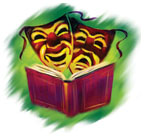 THR
361: The Art of Producing Theater
THR
361: The Art of Producing Theater
Lecturer: Mara L. Isaacs
This course doesn’t focus on budgets and numbers, but rather on the “artistic view of how to make plays happen,” says Isaacs, a visiting lecturer in English. Students will get an inside look at how producers approach their craft as they attend productions in Princeton and New York and question professional producers, playwrights, and directors who visit the class. Isaacs, who has worked with the McCarter Theatre Center since 1995 and has been its producing director since 2002, says she will offer the students a “very candid” look at the decisions shaping both immediate and longer-range projects at McCarter. The goal is to expose the class to a wide range of venues and works, at different stages of development, to help students learn “what it takes to make really great art,” Isaacs says.
Sample reading list: Peter Brook, The Empty Space; Marina Carr,
Phaedra Backwards; Moises Kaufman, The Laramie Project; Emily Mann, A
Seagull in the Hamptons; Mary Zimmerman, Argonautika; Tarell McCraney,
The Brother/Sister Plays ![]()

Professor James Smith will be gathering data in Beijing during the Summer Olympics. (Frank Wojciechowski) |
BREAKING
GROUND-Environmental Engineering
Probing urban weather patterns
The question on James Smith’s mind is a large one: How do urban environments affect the atmosphere and climate? To find answers, the civil and environmental engineering professor is looking closely at urban aerosols, tiny particles suspended in the air above cities, to see how they alter precipitation.
Using data from a long-term National Science Foundation study in Baltimore, Smith and graduate student Alex Ntelekos have shown that aerosols, along with other factors like the thermal effects of urban heat islands, contribute to the strong, organized thunderstorms that flood cities in the northeastern United States. Smith’s team is moving on to collect data in New York and Beijing — two cities that have shown very different aerosol effects — through collaborations with MIRTHE (Mid-Infrared Technologies for Health and the Environment), a multi-university research center based at Princeton. The center, directed by electrical engineering professor Claire Gmachl, develops sensors using laser technology.
In New York, Smith says aerosols serve as “cloud condensation nuclei,” or seeds around which cloud droplets form. Those cloud droplets ultimately build rain droplets and contribute to rainstorms. There are some “really interesting clues” about aerosols for cloud formation, according to Smith. “What we would like to know more about are the details of the chemical composition and size distribution of the aerosols,” he says. “It’s pointing to a mechanism of precipitation formation in which urban aerosols may, in fact, play an important role.”
Engineers from Princeton and City College of New York are working on monitoring systems that can provide more detail about the aerosols, and Smith hopes to embed that detail in modeling systems that simulate urban weather patterns.
Later this year, Smith and graduate students from his research group will begin measuring aerosols and trace gases in Beijing during the 2008 Summer Olympics, in collaboration with the Beijing Institute for Atmospheric Physics. The group will use atmospheric models that combine the Princeton data with other measurements to monitor air quality during the Olympics.
In Beijing, the aerosols generated by rapid industrialization and urbanization have caused a dramatic change in heavy precipitation during the last three decades. But instead of intensifying rain events, the aerosols have contributed to a significant decrease in rainfall. The reason, researchers hypothesize, is that aerosols have stabilized the atmosphere by reflecting back some of the sun’s rays. Less rain could be detrimental to the city’s water supply.
Aerosol effects are “very much tied to the details of the aerosol populations,” Smith explains. “In China, the emissions are so large that this radiative effect plays a very important role. The differences are instructive.”
The Beijing project will combine valuable environmental science with
a core goal of MIRTHE — developing better sensors. “It’s
an exciting process, working across disciplinary boundaries,” Smith
says. “[We’re] bringing in different elements with both the
technology side and the side where we can address really interesting science
problems that are of societal importance.”![]()
By B.T.

ALUMNI DAY is expected to draw more than 1,000 alumni and guests back to campus Feb. 23. Scheduled events include addresses by Madison Medalist Lawrence P. Goldman *69 *76 and Woodrow Wilson Award recipient John W. Rogers Jr. ’80, faculty lectures on topics ranging from global warming to Islamism to crisis diplomacy, an opening celebration of an exhibition marking the 125th anniversary of the University Art Museum, and the traditional Service of Remembrance and awards luncheon.
In the first application cycle since early admission was ended, the University received a record 20,118 APPLICATIONS, up 6 percent from the previous year. It’s the fourth consecutive year in which admission applications have set a record. Janet Rapelye, dean of admission, said the number and the quality of applicants “exceeded our expectations.” Thanks to an increase in applications from women, there was “an equal division between female and male applicants,” according to Cass Cliatt ’96, University spokeswoman. Applicants will be notified of decisions in late March. The University expects to enroll 1,240 to 1,250 members in the Class of 2012.
The University has selected an award-winning firm with extensive experience in the arts to design several buildings in the new arts neighborhood south of McCarter Theatre Center. STEVEN HOLL ARCHITECTS, a firm with offices in New York and Beijing, will design buildings that will house a black-box theater, a large dance studio, an orchestral rehearsal studio, acting and dance studios, classrooms, a café, and offices. Different architects are to be selected for an experimental media studio, a satellite for the University Art Museum, and a new transit station.
Starting next fall, select Princeton students will have the opportunity to study at one of the world’s top music conservatories, the ROYAL COLLEGE OF MUSIC in London. After auditioning for a spot through the study-abroad program, students will spend the fall of junior year in London studying technique and music history, developing aural skills, and performing in chamber music ensembles. At the end of the term, the students may audition for admission to the Royal College of Music’s master’s program after their graduation from Princeton. Designed for students who are considering a professional music career, the program provides rigorous training and a chance to “taste life in the music profession,” said Michael Pratt, director of Princeton’s Program in Musical Performance.
The University has begun subsidizing the cost of birth-control pills after student health centers lost their deep discounts as a result of changes to the federal Deficit Reduction Act. The new funding reduces the price from $15 to $6 per pack of oral contraceptives sold at University Health Services.
POLAND AND TURKEY will join Vietnam as locations for
summer courses for Princeton students this year. “Eastern Europe
though Film and Touch” will be offered in Krakow, and “Islam,
Empire, and Modernity: Turkey from the Caliphs to the 21st Century”
will be offered in Istanbul, as part of the Princeton Global Seminars
program. In addition, “America and Vietnam at War: Origins, Implications,
and Consequences” will be taught in Hanoi for the second consecutive
year.![]()

Courtland Perkins, an authority in the field of aircraft stability and
control and a member of the faculty from 1945 to 1978, died Jan. 6 at
his home in California. He was 95. Perkins was chairman of the aeronautical
engineering department from 1951 to 1970, a time when it was seen as a
national leader. He also was the engineering school’s associate
dean for resource development from 1965 through 1971. During leaves from
Princeton and after his retirement, Perkins served as chief scientist
and undersecretary of the Air Force, chairman of NATO’s aerospace
advisory group, and president of the National Academy of Engineering.![]()

